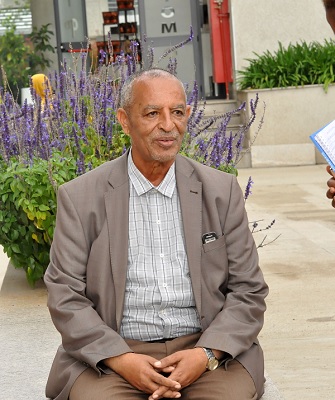
For all creatures living on earth, water is a great boon of nature. It is very difficult to find anything that is not related to water. Even if we only associate the benefits of this natural gift with the existence of human beings, we (human beings) can get a lot of basic benefits. To put it simply, water gives us food, hygiene, transportation, and many other benefits. It doesn’t take much research or digging to realize these basic benefits; just being human is enough.
However, water has many other positive aspects. If we look at this not at the individual level but at the national level, we can see the benefits of the sea, oceans, and rivers. Based on this, we would like to talk about the importance of water in terms of the economic and political interests of a country and related issues. We have been talking extensively with the guests we have invited, especially about the natural water resources that Ethiopia has and the historical and natural rights that Ethiopia should have.
Before that, let’s try to explore a little what the research results say about the economic and political benefits of a sea gate for a country. Access to seaports plays an important role in the economic and political situation of a country. The first role is economic growth, trade, and foreign exchange earnings; scholars mention that seaports facilitate international trade, allowing countries to earn foreign currency by exporting and importing. Another benefit is a cost reduction. This means that owning a seaport can reduce the cost of efficient transportation of imported goods, consumer products, and raw materials.
Another advantage is that it makes countries competitive. Scholars explain that access to (owning) seaports increases a country’s competitiveness in the international market. In addition, they explain that it has made a significant contribution to political influence and freedom. Mainly, coastal access gives a country more political influence, allowing it to assert its interests in regional and global affairs. These same studies have confirmed that owning a sea gate provides geostrategic options.
The studies show that seaports help a country effectively manage changing regional conditions by expanding its geostrategic options. Based on the above detailed information, today’s guest, Yasin Mohammed (Dr.), Addis Ababa University African and Asian Research Center instructor, raises various concerns. The Ethiopian Press Agency raised questions related to these issues while it had spent a few minutes. Have a nice read!
Would you brief us on the role of water bodies for the international benefit of a given country?
Water plays an irreplaceable role, from the individual to the nation. Oceans serve as connectors between different parts of the world. Commercial ships transport goods across natural and man-made harbors, navigating these bodies of water for weeks or months. Seaborne trade routes meet humans’ basic needs, making it essential for governments to control these sea areas to ensure the safety and sovereignty of their citizens.
Viewing water from this perspective reveals its significance beyond hygiene, drinking, food, and cooking, both globally and domestically. Consequently, countries worldwide dedicate extensive efforts to managing water resources, formulating policies for the careful utilization of rain and groundwater resources, and asserting control over adjacent seas for strategic advantage. In general, water plays a pivotal role in political, economic, and related human issues, underscoring its importance for both nations and individuals.
Water has been historically fundamental to civilization. For instance, ancient cooperative societies based their lives on nature, primarily subsisting on fruits and hunting. However, as they transitioned to agriculture, settling near rivers, the foundations of civilization were laid.
Major civilizations like Greece, Rome, Mesopotamia, and China originated from agricultural practices along riverbanks. Subsequently, these civilizations expanded their reach through water-based transportation, with notable explorers like Magellan navigating the globe via water routes. Rivers have been crucial for agriculture, transportation, and trade, serving as the main arteries of world commerce.
Many scholars agree that Ethiopia is a water tower in East Africa. How much of this resource has been exploited so far?
Despite abundant water resources, Ethiopia has not fully harnessed its water potential. The country’s rivers, like the Abbay and Baro Akobo, remain underutilized, while other rivers are primarily used for electricity generation. Properly utilizing these resources is essential for maximizing their benefits. Ethiopia must address internal capacity constraints and external influences to optimize water resource management effectively. Historically, external pressures, such as colonial perspectives on Africa, have hindered Ethiopia’s water resource development. Addressing these challenges through expert-led solutions and policy discussions is crucial for leveraging water resources to alleviate poverty and foster national development.
Water is indeed the foundation of civilization and development, highlighting the importance of water management for sustainable growth. Access to ports and rivers is critical for landlocked countries like Ethiopia, necessitating strategic planning and diplomatic engagement to secure sea gateways. Collaborative efforts across sectors and generations are essential to enhance water resource utilization and promote economic prosperity. Educating future generations on water management and instilling a sense of responsibility towards water conservation from an early age is vital for sustainable development. By prioritizing water resources and addressing internal and external challenges, Ethiopia can unlock its full potential and pave the way for long-term growth and prosperity.
What is the benefit of possessing access to the sea for a country?
The possession of sea gates is crucial for a country’s development and regional influence. Seaports play a pivotal role in economic growth by fostering trade, investment, and industrialization, with significant contributions to infrastructure development. Ports also play an indispensable role in promoting development, creating jobs, and enhancing infrastructure in surrounding areas. Ethiopia, a landlocked country, faces inherent disadvantages due to its lack of access to the sea. While Djibouti currently serves as the main port for Ethiopia’s foreign trade, relying solely on one port poses limitations and risks. To mitigate these challenges, Ethiopia is exploring equitable port utilization agreements with neighboring countries like Eritrea, Djibouti, and Somaliland, and considering future collaborations, such as the Lamu port in Kenya. The strategic significance of sea gates is multifaceted, enabling global connectivity, trade, and economic prosperity.
How do you see the distance Ethiopia has gone to find a sea gate?
If we say that water is the foundation of civilization, we use the average port. Our country has been landlocked for a long time. At present, questions are being raised about whether it is good if there is a port. For my part, I look at these questions very favorably. I believe that the question should be asked. If this question is answered, perhaps it will be beneficial not only for the government or any individual, but for all Ethiopians. Therefore, it is the role and responsibility of the relevant parties to present the question in an appropriate manner and to conduct the work in a highly diplomatic manner.
Of course, any Ethiopian should think about and work for his country. I don’t think there is anyone who doesn’t want Ethiopia to get a sea port or use its rivers for its development, as water is the basis of growth for a given country. When the conditions are right to take advantage of this large base, it is better to support and encourage than to oppose and hinder.
Experts are expected to support Ethiopia in being able to use water resources in a scientific way. Other people should also understand that water is very important for the development of our country and provide the necessary support.
If we agree that water is the basis of life and development, how should everybody handle this precious resource?
Doing this as much as possible will not only save our water from being wasted, but also help us get a wider benefit. However, especially the younger generation needs to understand more about the country’s water resources. How many rivers does Ethiopia have? How can the country use its rivers? How much can the state grow if it uses water resources? They should think more about water resources; ask related questions and analyze the situation as well as the area they can contribute to their country while reading books.
Above all, if possible, it is necessary to work with children to learn about water from their primary and secondary education in the curriculum. At this level, as we have informed them, their ability to control wasted water and to understand more about the benefits and harms of water will be developed.
Therefore, everyone should pay attention to water. There is no doubt that growth will come when attention is paid to water. As the world grew with water, it became the basis of the development of the countries in the world. Ethiopia, on the other hand, has lost its number-one port. On the other hand, despite having many rivers, it is not using its rivers properly.
It is necessary to find a solution by knowing the problems and solving them properly. One of the solutions is to remove the old barriers that prevent us from using our water resources and alleviate the problems. Expanding port access and conducting extensive diplomatic work is another. On the other hand, I believe that in order to have sustainable development, it is necessary to work from the lower elementary level so that the generation knows about water in depth.
Thank you very much for your kind collaboration!
It is my pleasure
BY GIRMACHEW GASHAW
THE ETHIOPIAN HERALD SATURDAY 27 APRIL 2024





